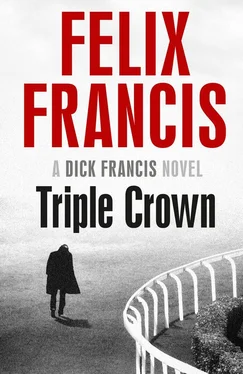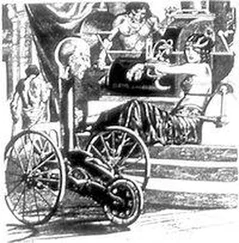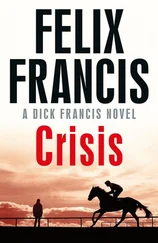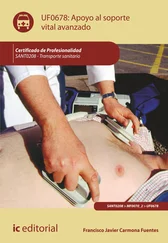Maria was the only female in the line-up. Slim and young, she was wearing a skimpy, olive-green T-shirt above tight denim jeans with mock-designer holes in the knees. She was beautiful, with high cheekbones under a bronze skin, and she clearly knew how to display her body to maximum advantage, but she didn’t seem too pleased to be asked to look after the new boy.
‘I should not be treated like common hot-walker,’ she said with a slight Spanish accent, tossing her thick dark hair from side to side in displeasure. ‘I am not hot-walker, I should be groom.’
She was certainly hot, at least to my eye.
I very quickly slipped into the routine of George Raworth’s barn.
Other than Keith, the barn foreman, there were seven full-time staff, including Maria, plus a yard boy who was clearly the oldest of us all, using his ever-present broom more as a support than for actual sweeping.
Maria showed me where the stable equipment was stored.
‘Have you been here long?’ I asked her, trying to be friendly.
‘I came here January as hot-walker,’ she said haughtily, still unhappy, ‘but I should be groom by now. I have done my study.’
A hot-walker was someone employed simply to lead the horses around as they cooled after exercise. It was the lowest rung on the horse-care ladder.
‘But I am still treated by boss as mere hot-walker.’ She sighed and drew herself up to her full height, posing and pouting with obvious irritation. Her facial expression reminded me of a flamenco dancer.
I berated myself slightly for fantasising about Maria cavorting around a dance floor in high heels. I was not here to chase the female stable staff.
‘Is being a hot-walker all that bad?’
‘I want better,’ she said. ‘How come you are groom already when I be here much longer?’ She turned and walked off, gyrating her hips in an overly belligerent manner. I found it rather sexy, and she knew it.
I sighed and went to work.
I cleared the soiled bedding in stalls one to four and replenished the straw for the equine residents, placing the waste into the huge grey metal skips that were earmarked for the purpose at either end of the barn.
I was quite surprised to see that straw was in widespread use, the preference in the UK having moved towards wood pellets, shavings or shredded newspaper.
As Keith had told me earlier, the barn had thirty-two stalls — two blocks of sixteen built back-to-back down the centre — with a wide covered walkway called a shedrow that ran right around the building inside the exterior walls.
The stalls, like the rest of the building, were constructed from wood and they opened onto the shedrow so that the horses were able to look out over half-doors.
At each corner of the barn was an exit with a sliding door. During the day the doors were left open with only a single bar across the gap to prevent any loose horses from escaping.
The doors were slid shut at night but not locked. The wooden structures, together with large quantities of straw and hay, meant that fire was always uppermost in people’s minds and large signs with ‘No Smoking/Prohibido Fumar’ hung from the rafters every twenty feet or so along the shedrow.
The barns at Belmont were fitted with sprinkler systems but, nevertheless, locked exit doors would hamper the evacuation of the horses if the worst was to happen, as had occurred in 1986 when forty-five top Thoroughbreds, collectively worth several million dollars, had all died one night when fire destroyed barn 48 on the eastern edge of the site.
George Raworth, accompanied by Charlie Hern, made a tour of his stable, stopping at each stall to inspect the occupant and discuss progress. We grooms had to remove the bandages from the horse’s legs and stand, holding the animal’s head, while both George and Charlie ran a hand down the back of each equine limb, feeling for unwanted heat in the tendon or ligaments.
Like many others, the Raworth’s horses all wore leg bandages as a matter of course, not because they were injured but to add support and to hold cotton pads that prevented nicks and bruises caused by kicking into themselves. The bandages were also used to hold medications and liniments in place, often used after racing to ease any slight sprains.
‘Everything OK, Paddy?’ Charlie asked as he and George came into Stall 1 where I had a firm grip of the headcollar of a four-year-old gelding called Paddleboat.
‘Fine, sir, thank you,’ I replied.
‘Which part of Ireland are you from?’ George asked.
‘From the south, sir,’ I said. ‘County Cork.’
‘My mother’s father was Irish.’
I hadn’t spotted that in any of my research.
‘He came from a bit further north. From Thurles in County Tipperary.’
‘I know it,’ I said. ‘I went to the racecourse there as a kid.’
‘I’ve never been able to get there myself,’ George said. ‘Maybe one day.’
I breathed a small silent sigh of relief. I hadn’t been there either.
I stood and listened as the two men turned their attention to Paddleboat.
‘He ran Thursday in a seven-eighths-mile, fifteen-grand claimer,’ Charlie said. ‘Finished sixth of eight. Never in with a chance and not claimed.’
‘Is he on Clen?’ George asked.
‘Has been,’ Charlie replied. ‘Came off it to go to the track.’
‘Put him back on it. Up the dose.’
Charlie wrote something down in a notebook.
‘If he shows no improvement soon,’ George went on, ‘we’ll have to get rid of him — maybe in an even lower claimer. Ship him down to Philly Park if necessary.’
Unlike in the UK, claiming races made up the bulk of contests at US racetracks. Before the start, any horse in the race could be claimed by a new owner for a fixed amount as determined by the race conditions. Title in the horse was transferred as the starting gates opened, although the former owner was entitled to any purse-money earned in that particular race.
It would clearly not be sensible to run a really good horse in a race in which the claim figure was very low. The horse would be sure to be claimed by a new owner and, even if it won the purse, the original owner would lose a valuable animal for a fraction of its true worth.
However, if a horse was valued around the claim figure then, if it were claimed, the original owner would recover his initial investment, plus he has the chance of picking up a substantial purse on top if it won the race.
In this way, racetracks used claiming races to encourage horses of roughly equal value, and hence of a comparable standard, to race against one another. This made the racing more competitive and thus boosted the ‘handle’, the total sum of money wagered by the public. The handle was what ultimately determined the tracks’ income, which was what they really only cared about. Each day’s programme would have claiming races with a range of claim amounts and horses were entered accordingly.
Claiming races were popular with some owners but usually less so with the trainers, as they had little idea if a horse that was in their care in the morning would be residing in someone else’s barn come evening.
Not that all horses were entered in claimers. The top-class ones, those that contested the major stakes races, never had their ownership so easily changed, but for the journeyman horses, those that made up the majority of the backside population at Belmont Park, they lived a merry-go-round life in the barns, being repeatedly claimed by new owners and sent to different trainers.
Paddleboat was clearly not going to remain in Raworth’s barn for much longer. If a new owner didn’t claim him soon, I feared he’d be off to the knacker. However, I was much more interested in what drugs George was planning to give him in the interim.
Читать дальше












